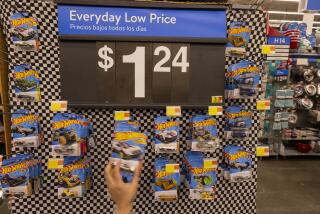Digital radio wins support of Wal-Mart
- Share via
NEW YORK — The radio industry’s digital efforts are getting a boost from America’s biggest retailer.
Wal-Mart Stores Inc. has agreed to sell receivers for digital radio, becoming one of the most important supporters of the largely unknown technology that promises static-free digital audio and additional programming alongside standard broadcasts.
Broadcasters are pinning their hopes on digital broadcasts, streaming Web audio and other digital efforts as listeners increasingly tune out traditional radio. So far, consumers largely have shrugged off digital radio, promoted as HD radio, or confused it with satellite radio, but supporters hope Wal-Mart’s heft will help it take off.
“When America’s biggest retailer steps up, it shows we’ve really reached prime time,” said Peter Ferrara, president of the HD Digital Radio Alliance, a coalition of major radio companies that support the technology.
Bentonville, Ark.-based Wal-Mart said it would start selling a $190 car-radio model in about 2,000 of its 3,500 stores and on its website. In addition, the giant retailer will support consumer education and other promotion for HD radio.
Broadcasters believe they must embrace digital technology to survive, as consumers have an array of entertainment choices. There are more than 1,100 radio stations broadcasting digitally, and about half offer more than one program stream.
A rock station in New York, for example, can play hip-hop or country music on digital “side channels,” allowing stations to expand their programming on the same radio frequency.
Despite heavy marketing of HD radio, few consumers have embraced it. Consumers confuse the free HD radio with the subscription-based satellite radio or don’t want to buy a new radio to get marginally better sound and extra programming they can get from Internet radio, music-playing cellphones or other gadgets.
“HD radio has a difficult spot to carve out in what’s becoming a very much more evolved audio-listening landscape,” said John Rose, a partner with Boston Consulting Group.
But Martin Kon, head of the media practice at Mercer Management Consulting, said it took high-definition television a long time before it became a consumer staple. Like other new technologies, “until you see it -- or in this case, hear it -- it’s very difficult to explain what it is,” Kon said.
The radio industry also is positioning HD radio as a free alternative to satellite radio, making price-conscious Wal-Mart shoppers a key target. HD radio “is truly a product that our customers want to have available in our stores,” said Tara Raddohl, a spokeswoman for the retailer.
Kon says the key to HD radio’s success is automakers. Commuters are a large and devoted radio audience, and if car companies agree to install HD radios, millions of Americans will be exposed to the technology.
Luxury carmaker BMW has an agreement to include HD radios as an option, and other carmakers could follow.
Perversely, the success of HD radio could hurt the radio business. Sirius Satellite Radio Inc. and XM Satellite Radio Holdings Inc. have cited competition from HD radio to justify their proposed merger, which traditional radio broadcasters see as a threat to their struggling industry.
The “HD” in HD radio originally stood for “hybrid digital” rather than “high definition.” It’s now a name with no specific meaning.
More to Read
Inside the business of entertainment
The Wide Shot brings you news, analysis and insights on everything from streaming wars to production — and what it all means for the future.
You may occasionally receive promotional content from the Los Angeles Times.










